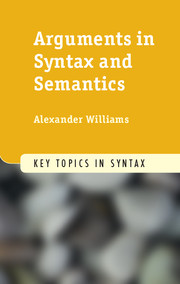5 - Implicit arguments
Published online by Cambridge University Press: 05 January 2015
Summary
INTRODUCTION
One use of “argument” is particularly subtle, and that is in the context of “implicit argument.” In this chapter we will try to understand some of what falls under this heading. I begin (Section 5.2) with the rough idea: an implicit argument is an entailed but unrealized role that is in some way like an overt argument. Then (Section 5.3) I will justify and explicate a division of unrealized roles, URs, into two types, existential and definite. Next I observe (Section 5.4) that the availability and interpretation of a UR cannot be predicted just on the basis of a predicate's satisfaction conditions. The upshot of these two sections (5.3–5.4) is the conclusion that all definite URs, at least, must be regarded as implicit arguments in some broad sense. The next two sections, 5.5 and 5.6, concern arguments for treating certain URs as implicit arguments in a narrower sense as well. Section 5.5 shows that definite, but not existential, URs are prone to covarying readings in the scope of a quantifier, a semantic dependency otherwise limited to overt dependents. Section 5.6 foreshadows a case study on the unrealized deep subject role of a short passive, to be developed at length in Chapter 12.
Before setting out, let me quickly warn that I will not be discussing the central cases of pro, like Mandarin (1); or of PRO, like (2,3); or of what are called “middles” in traditional grammar (Kemmer 1993), like (4,5).
(1) [pro] qu -le Beijing.
x go -PFV Beijing
‘I/you/he/she/it/they went to Beijing.’
(2) Mok promised Lee [PROk] to cook sausage.
(3) [PRO] to cook sausage would be a good idea.
(4) Lee and Mo met [= each other] for lunch.
(5) Lee shaved [= herself].
I do allow, however, that some of the implicit arguments I will discuss might involve non-central instances of these categories.
- Type
- Chapter
- Information
- Arguments in Syntax and Semantics , pp. 94 - 118Publisher: Cambridge University PressPrint publication year: 2015

